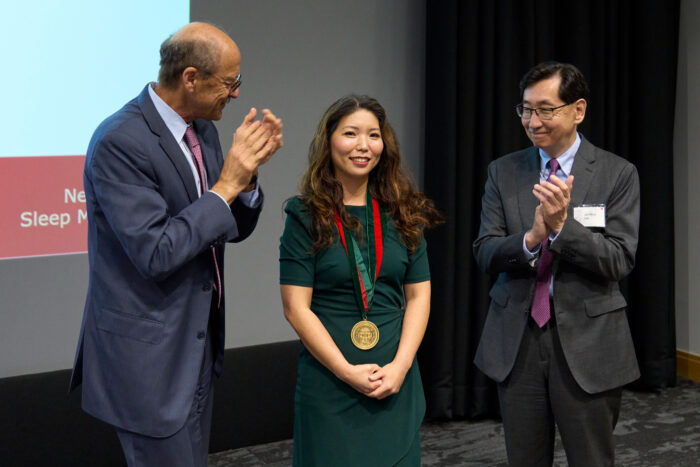Ju named Morriss Professor
Neurologist studies role of sleep in neurodegenerative diseases
 Dan Donovan
Dan DonovanNeurologist Yo-El Ju, MD, (center) is applauded by David Perlmutter, MD, (left) the George and Carol Bauer Dean of Washington University School of Medicine in St. Louis, and Jin-Moo Lee, MD, PhD, (right) the Andrew B. and Gretchen P. Jones Professor and head of the Department of Neurology, during her installation ceremony as an inaugural Barbara Burton and Reuben M. Morriss III Professor. Ju has conducted groundbreaking research on the role of sleep in neurodegenerative diseases such as Alzheimer's.
Neurologist Yo-El Ju, MD, a physician-scientist whose discoveries have illuminated the complex relationship between sleep and neurodegenerative disease, has been named an inaugural Barbara Burton and Reuben M. Morriss III Professor at Washington University School of Medicine in St. Louis.
Ju was installed by David H. Perlmutter, MD, executive vice chancellor for medical affairs, the George and Carol Bauer Dean of the School of Medicine and the Spencer T. and Ann W. Olin Distinguished Professor.
The professorship was created through a bequest from Reuben M. Morriss III and Barbara Burton Morriss to Washington University, to advance Alzheimer’s disease research. The bequest funds three professorships at the School of Medicine.
“The Morriss family’s generous support for Alzheimer’s research represents a heartfelt commitment to improving the lives of countless individuals and families affected by this terrible disease,” said Chancellor Andrew D. Martin. “Their benevolence reaffirms the importance of collaborative efforts in the pursuit of medical breakthroughs and accelerates progress toward finding better treatments and, ultimately, a cure for this complex condition.”
Alzheimer’s disease was Ju’s entry point into the world of sleep and neurodegeneration. In 2013, building on work from the lab of David M. Holtzman, MD, the Barbara Burton and Reuben M. Morriss III Distinguished Professor, she, Holtzman and colleagues published the first study in people that showed an association between poor sleep quality and presymptomatic Alzheimer’s disease. In 2017, she published a paper in the journal Brain demonstrating that disruption of slow-wave sleep — the deep, restful phase of sleep — is associated with higher levels of amyloid beta, a brain protein that, when it accumulates, is linked to Alzheimer’s disease. This discovery opened the door to experimental sleep-based interventions to prevent or treat Alzheimer’s.
“Philanthropy and generosity were hallmarks of the lives of Mr. and Mrs. Morriss, whose investment in Washington University, and specifically in Alzheimer’s research, continue to make a profound difference today,” Perlmutter said. “Yo-El Ju’s work on disordered sleep and how it impacts Alzheimer’s disease brings rigorous clinical research into a fascinating area of everyday life that has an enormous impact on health and disease. I am so excited about the work that she is doing, and I know she will continue to make an impact.”
More recently, Ju has expanded her focus to include other neurodegenerative diseases characterized by toxic accumulation of brain proteins. She leads an international consortium studying REM sleep behavior disorder (RBD), a condition characterized by the acting out of dreams and the buildup of the protein alpha-synuclein in the brain. About 80% of people diagnosed with RBD go on to develop a neurodegenerative disease such as Parkinson’s disease or Lewy-body dementia. The consortium is developing clinical, neuroimaging, and biofluid biomarkers of synuclein-associated diseases in preparation for a future clinical trial to treat RBD and prevent the development of serious neurodegenerative disease.
“Yo-El Ju is internationally recognized for her studies relating sleep to the pathogenesis of several neurodegenerative diseases,” said Jin-Moo Lee, MD, PhD, the Andrew B. and Gretchen P. Jones Professor and head of the Department of Neurology. “She published several landmark studies supporting a link between sleep disturbance and biomarkers of Alzheimer’s disease. It’s an honor to have her on our faculty.”
Ju is also a professor of anesthesiology and a co-director of the Washington University Center on Biological Rhythms and Sleep. She cares for patients with sleep disorders at the Washington University Sleep Medicine Center, including a specialty clinic for RBD, as well as other neurology patients at Barnes-Jewish Hospital.
Ju earned her undergraduate degree in neurobiology at Harvard College, followed by her medical degree at Columbia University College of Physicians and Surgeons. She moved to St. Louis for a neurology residency at Washington University School of Medicine and Barnes-Jewish Hospital, followed by clinical and research fellowships in sleep medicine, also at Washington University. She joined the faculty at the School of Medicine in 2011. Among her many honors and awards are the Wayne Hening Sleep Medicine Investigator Award from the American Academy of Neurology, and the Young Investigator award from the World Association of Sleep Medicine.
A graduate of Saint Louis Country Day School in Ladue, Mo., and Princeton University in New Jersey, Reuben Morriss III earned a law degree from Washington University in 1964. He joined Boatmen’s Bank, beginning a long career as a leader of the St. Louis financial sector. He eventually became chairman and president of Boatmen’s Trust Co., a position he held until his retirement in 1995. He was a board chair of Mary Institute and Saint Louis Country Day School and of William Woods University in Fulton, Mo. He also served on the boards of St. Luke’s Hospital in Chesterfield, Mo., and the St. Louis Bi-State American Red Cross.
Barbara Burton Morris was a graduate of John Burroughs School in Ladue, and Briarcliff College in Westchester County, N.Y. She was a board member of the Alzheimer’s Association and the Central Institute for the Deaf, and she donated time and resources to many other local charitable and cultural institutions.
The couple was married for 48 years and had two children, Burton Douglass Morriss and Barbara Dulany Morriss; and five grandchildren. Reuben Morriss III died in 2006, and Barbara Burton Morriss died in 2018.






